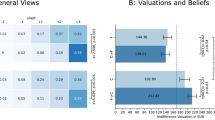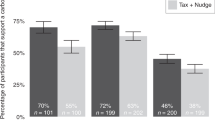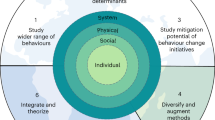Abstract
Behavioural public policy has received broad research attention, particularly in the domain of motivating pro-environmental behaviours. We investigate how far the efficacy of arguably one the most popular behavioural policy tools (green ‘default change’ nudges) depends on the associated cost. On the basis of a field study involving carbon offsets for over 30,000 flights booked by more than 11,000 airline customers, we show that green defaults have a large effect on voluntary climate action, even when several hundreds of Euros are at stake. The effect fully vanishes only as costs approach approximately €800.
This is a preview of subscription content, access via your institution
Access options
Access Nature and 54 other Nature Portfolio journals
Get Nature+, our best-value online-access subscription
$29.99 / 30 days
cancel any time
Subscribe to this journal
Receive 12 digital issues and online access to articles
$119.00 per year
only $9.92 per issue
Buy this article
- Purchase on Springer Link
- Instant access to full article PDF
Prices may be subject to local taxes which are calculated during checkout




Similar content being viewed by others
Data availability
Anonymized raw data are available on the Open Science Framework (https://osf.io/rd7sy) in accordance with a data protection agreement with the airline partner (for example, passenger IDs replaced with other unique IDs).
Code availability
Results reported in the main text and Supplementary Information can be reproduced using the statistical code published via the Open Science Framework (https://osf.io/rd7sy). All data have been analysed using the open-source software R.
References
Jachimowicz, J. M., Duncan, S., Weber, E. U. & Johnson, E. J. When and why defaults influence decisions: a meta-analysis of default effects. Behav. Public Policy 3, 159–186 (2019).
Mertens, S., Herberz, M., Hahnel, U. J. J. & Brosch, T. The effectiveness of nudging: a meta-analysis of choice architecture interventions across behavioral domains. Proc. Natl Acad. Sci. USA 119, e2107346118 (2022).
Günther, S. A., Staake, T., Schöb, S. & Tiefenbeck, V. The behavioral response to a corporate carbon offset program: a field experiment on adverse effects and mitigation strategies. Glob. Environ. Change 64, 102123 (2020).
Johnson, E. J., Hershey, J., Meszaros, J. & Kunreuther, H. Framing, probability distortions, and insurance decisions. J. Risk Uncertain. 7, 35–51 (1993).
Thaler, R. H. & Benartzi, S. Save More TomorrowTM: using behavioral economics to increase employee saving. J. Polit. Econ. 112, S164–S187 (2004).
Chapman, G. B., Li, M., Colby, H. & Yoon, H. Opting in vs opting out of influenza vaccination. JAMA 304, 43 (2010).
Johnson, E. J. & Goldstein, D. Do defaults save lives? Science 302, 1338–1339 (2003).
Altmann, S., Falk, A., Heidhues, P., Jayaraman, R. & Teirlinck, M. Defaults and donations: evidence from a field experiment. Rev. Econ. Stat. 101, 808–826 (2019).
Ebeling, F. & Lotz, S. Domestic uptake of green energy promoted by opt-out tariffs. Nat. Clim. Change 5, 868–871 (2015).
Liebe, U., Gewinner, J. & Diekmann, A. Large and persistent effects of green energy defaults in the household and business sectors. Nat. Hum. Behav. 5, 576–585 (2021).
Tiefenbeck, V. et al. Overcoming salience bias: how real-time feedback fosters resource conservation. Manag. Sci. 64, 1458–1476 (2018).
Allcott, H. Social norms and energy conservation. J. Public Econ. 95, 1082–1095 (2011).
Hortaçsu, A., Madanizadeh, S. A. & Puller, S. L. Power to choose? An analysis of consumer inertia in the residential electricity market. Am. Econ. J. Econ. Policy 9, 192–226 (2017).
Camilleri, A. R., Larrick, R. P., Hossain, S. & Patino-Echeverri, D. Consumers underestimate the emissions associated with food but are aided by labels. Nat. Clim. Change 9, 53–58 (2019).
Sunstein, C. R. Green defaults can combat climate change. Nat. Hum. Behav. 5, 548–549 (2021).
Enke, B. et al. Cognitive Biases: Mistakes or Missing Stakes? NBER Working Paper No. 28650 (NBER, 2021). https://doi.org/10.3386/w28650
Kaiser, M., Bernauer, M., Sunstein, C. R. & Reisch, L. A. The power of green defaults: the impact of regional variation of opt-out tariffs on green energy demand in Germany. Ecol. Econ. 174, 106685 (2020).
Cramton, P., MacKay, D. J. C., Ockenfels,A. & Stoft, S. (eds) Global Carbon Pricing: The Path to Climate Cooperation (MIT Press, 2017). https://doi.org/10.7551/mitpress/10914.001.0001
Ghesla, C., Grieder, M. & Schubert, R. Nudging the poor and the rich—a field study on the distributional effects of green electricity defaults. Energy Econ. 86, 104616 (2020).
Smith, N. C., Goldstein, D. G. & Johnson, E. J. Choice without awareness: ethical and policy implications of defaults. J. Public Policy Mark. 32, 159–172 (2013).
Schubert, C. Green nudges: do they work? are they ethical? Ecol. Econ. 132, 329–342 (2017).
Ambuehl, S., Bernheim, B. D. & Ockenfels, A. What motivates paternalism? An experimental study. Am. Econ. Rev. 111, 787–830 (2021).
Mrkva, K., Posner, N. A., Reeck, C. & Johnson, E. J. Do nudges reduce disparities? Choice architecture compensates for low consumer knowledge. J. Mark. 85, 67–84 (2021).
Acknowledgements
We acknowledge the research assistance of A. Lange and V. Schneuwly. S.B. gratefully acknowledges the financial support of the Swiss Federal Office of Energy through the ‘Energy, Economy, and Society’ programme (grant agreement no. SI/502093–01). A.O. gratefully acknowledges the support of the German Research Foundation (DFG) through the excellence strategy (grant agreement no. EXC 2126/1-390838866) and the European Research Council (ERC) (grant agreement no. EU Horizon 2020 741409). The funders had no role in study design, data collection and analysis, decision to publish or preparation of the manuscript.
Author information
Authors and Affiliations
Contributions
S.B., O.L., A.K., F.S., A.O. and A.W. conceptualized the study. S.B., F.S., A.O. and A.W. determined the methodology. S.B., F.S. and A.W. analysed the data. O.L. and A.K. curated the data. S.B., F.S. and A.W. wrote the initial draft. S.B., O.L., A.K., F.S., A.O. and A.W. commented on and revised the drafts. S.B., F.S. and A.W. visualized the results. S.B. and A.O. supervised O.L., A.K. and F.S. S.B. administrated the project. S.B. and A.O. acquired funding.
Corresponding author
Ethics declarations
Competing interests
The authors declare no competing interests.
Peer review
Peer review information
Nature Human Behaviour thanks Manuel Grieder and the other, anonymous, reviewer(s) for their contribution to the peer review of this work.
Additional information
Publisher’s note Springer Nature remains neutral with regard to jurisdictional claims in published maps and institutional affiliations.
Supplementary information
Supplementary Information
Supplementary Figs. 1–10 and Tables 1–15 and references.
Rights and permissions
About this article
Cite this article
Berger, S., Kilchenmann, A., Lenz, O. et al. Large but diminishing effects of climate action nudges under rising costs. Nat Hum Behav 6, 1381–1385 (2022). https://doi.org/10.1038/s41562-022-01379-7
Received:
Accepted:
Published:
Issue Date:
DOI: https://doi.org/10.1038/s41562-022-01379-7
This article is cited by
-
Message framing to promote solar panels
Nature Communications (2023)
-
Nudging climate action: exploring the impact of active default choices on renewable energy program participation
Energy Efficiency (2023)



